- Home
- Jess Walter
We Live in Water: Stories Page 3
We Live in Water: Stories Read online
Page 3
On the top floor, Michael found he had cell phone coverage again, and he listened to a new message from Tracy: “I know you’re up in Idaho. I just wanted to tell you that I’m leaving Megan’s Babysitter Club books on the built-in in the living room.” And then she paused. “She’s worried about having something to read when she comes to your house.” The words your house were a kick to Michael’s stomach. He could tell Tracy felt it too. On the message, she sounded clipped, holding something back. “I hope you find what you’re looking for, Michael.”
He pressed the button to delete the message, but as her voice faded, Tracy said, “Oh, and one more . . .” but she was gone. He tried to call her and got no answer.
He met Ellie in the lobby. “You can ride with me,” she said and started for the front door before he could answer. She wore a soft black leather coat, and as he followed her out to the parking lot, Michael shifted uneasily. After the years of cheating on Tracy, maybe it was just muscle memory with him, the guilt.
“This whole area is different from how it was thirty years ago,” Ellie said as they drove away from the resort. “There were only two cabins on this whole side of the lake when I was born. Now, they’re like tract homes. Secondaries a mile from the lake go for four hundred thousand. Our little crop-duster airport is full of private jets.” She said a couple of celebrities’ names, conspiratorially, the same names that Michael had read about in his research, almost as if the names themselves had become tourist attractions.
They drove away from the crossroads, down the southbound four-lane highway, past an Indian casino, its parking lot jammed with cars. “This side of the lake was all forest back then,” she said. “It was the untamed side.” Michael thought about telling her that he’d pictured it that way. But what would be the point? “My dad tells some pretty wild stories,” she said. “Crazy how much can change in thirty years.”
He’d had that thought recently, too—how far removed he felt from a father who fought in World War II and gambled at roadhouses. “I remember driving from Tahoe one time,” Michael said, “and going through the Donner Pass and thinking that just a few generations before, that little spot was impassable, and turned people into animals. And now I can just . . . drive through it. Like any stretch of highway.”
They drove a few more miles, and then cut along an access road winding down a hillside above the shoreline. Ellie drove slowly past cute signs with nautical themes and stacked mailboxes above clusters of cabins and A-frames.
“My dad built the first cabin on this side, in fifty-five,” Ellie said. She turned off the road and they came around a huge boulder to the back of a modest, wood-frame building with windows facing the lake and stairs down to the rocky shore. Michael had the strange sensation of seeing what he’d imagined. “Thank you for doing this,” he said.
Ellie turned off the car and stared at the house. “That time of my father’s life fascinates me,” she said. “It’s hard to reconcile the stories he tells with the sweet, silly man he is now.” She opened her door and paused. “Oh. Before we go in . . . there’s something you should know about my dad. It can be jarring if you’re not prepared for it.”
1958
BANNEN SLAPPED him like he was a damn woman. Oren Dessens spun and fell against the craps table, cheek stinging. He scurried backward, beneath the table, and against the scratchy cedar wall. He put his hands up as Bannen stalked toward him. “Wait, wait. Just listen to me—”
“Oh. He wants me to listen.” Bannen spoke over his shoulder, to nervous hacks of laughter. The place was nearly empty, just the handful of Bannen’s usual ass-sniffers, tough guys as long as they were together. It was dark, all the lights shut off except the one behind the bar. Bannen’s thick jaw was clenched and his white hair had come out of its straight furrows and was falling down in his eyes. “You believe this guy? Steals from me and now he wants me to listen to him. You believe this son-of-a-bitch?”
Oren looked up at Flett, standing beside the craps table, his shoulders turned a few degrees. He was fingering some chips and staring at his shoes. Oren had foolishly believed that Flett could run interference for him, plead his case to Ralph Bannen. Now Oren saw there was no way Flett could do that. And he didn’t really blame him. Flett was in no position to get him a deal. He owned the roadhouse but it was Bannen who ran book out of it and who paid off the sheriff, Bannen who brought the whores up from Wallace and who muscled the guys who couldn’t pay. Oren had thought he was pleading his case to the house by going to Flett, but Bannen had always been the house. And it was Bannen’s ex-whore wife he’d banged, and Bannen’s safe he’d broken into. He remembered something that Flett always said: only three kinds of trouble out here—money, women, and Ralph Bannen. I hit the trifecta, Oren thought.
He started to pull himself up against the cedar wall and felt a sharp kick to his side that lifted him and dropped him to the floor again. A cowboy boot. Oren thought it might have split his ribs. When he could open his eyes, he looked up to the pinched face of Rutledge. Rutledge, who he’d run down to Lewiston not three weeks ago to fish steelhead. Jesus. This was bad. The guys, five of them including Bannen and Flett, stood circled around him, a pack of dogs. Oren wheezed.
“So what do I do?” Bannen asked. He looked around the circle, grim male faces all of them, eyes darkened by the dim lights in this room, all of them with shadowy evening beards. “What about you, Timmy? What would you do with a guy like this?”
Tim Flett was Oren’s age, thirty-three, their birthdays just two months apart. Oren wondered why this would come to him now, maybe because it was the only thing. Otherwise, they couldn’t be more different. Tim was a local, grew up in his daddy’s sawmill and lived a mile from where he was born. Oren was a roamer from Montana originally, who’d skipped along the Highline after the war, then down into the Idaho panhandle and into Washington. Tim was a settler, took the money he inherited from his old man, bought this roadhouse and built his home on the lake. Oren couldn’t settle for anything, even a perfectly good girl like Katie. Always scratching for money, losing jobs, chasing trouble. Oren wondered if he could’ve been a guy like Tim Flett, living above the surface, instead of always below.
“Shoot, Ralph. I don’t know,” Flett said. He was a pretty big guy himself, with short red hair curled tight on top and cheeks and neck that were always scarlet. But he wasn’t big like Bannen, whose chest heaved in and out as he breathed.
“No. Come on, Timmy. Tell me.” Bannen looked around. “This is your place. What would you do to a guy who dicks your wife so he can steal from you?”
Oren didn’t dare correct him. Bannen’s wife had been one of the sweeter whores Bannen ran before he took her out of commission, and getting her had always been the point. The safe was an afterthought. No, he’d only taken a little of Bannen’s money, but he’d had every last bit of the man’s wife.
Flett made eye contact with Oren and then looked away. “Since he came in on his own, I’d just hit him around some,” Flett said quietly, “maybe break something.” He looked at Oren again, and seemed to want him to know this was the best he could possibly do. “And then he’s gotta get so far outta town that not only do you never see him again, you never hear his name again.”
So that was the play. It was, Oren saw, as much defense as Flett could offer on his behalf. And at that moment, sucking air through the pain of broken ribs, his face burning, staring up at Ralph Bannen, Oren was grateful for it.
“I don’t know,” Bannen said, way too quickly, and Oren went cold. “I don’t think that’ll do it for me, Timmy. I know this piece of shit is your friend, but that just . . . just don’t do it for me.”
That was when Oren moved. He moved like he moved in poker, not thinking about it until he did it, the way he never looked at his cards until it was his bet, because if he had no idea what he had, then no one else would be able to read him. He jumped, grabbed hold of the leg of the craps table, and pulled it over between him and Bannen. And then he had to fi
nd a spot through the semicircle. Flett, of course. It was the only play and Flett seemed to know it. Oren hit his friend full in the chest with his shoulder and the man gave, stumbled backward into a blackjack table behind him. Rutledge grabbed for him but Oren spun and was out the door. It was cold outside. He’d come out the back door, opposite side of the parking lot, and he ran as fast and as low as he could, into the trees. At first he couldn’t tell if anyone was behind him, but then he could hear voices and the crunch of brush.
Oren ran like an animal, scrambling and darting, almost on all fours. The air burned his lungs. He tripped over something and scratched himself but he barely slowed. Tree limbs swatted at him. It was so dark in these woods that, when his eyes finally adjusted, he found it nearly impossible to believe he hadn’t run full into a tree. They were thick all around him and he moved like a kid running through a crowd of—Oh, shit.
Oren came to a stop, panting.
Goddamn it! He looked back over his shoulder. He’d brought Michael to Flett’s house earlier in the day, that was one thing. But bringing a six-year-old to Two Bridges—what was he thinking? He wasn’t, that’s what. He could’ve easily taken the kid to Katie’s for the night. Flett had even suggested leaving Michael at his house, in the basement. “You see how much he loves them fish,” Flett had said. “He’ll be fine.”
Maybe Flett would find the kid and take him home. Even Bannen, asshole that he was, wouldn’t take out adult business on a kid. Would he? Oren needed to keep moving. Make his way south, to the highway, to Hayden. Maybe boost a car.
He started running again but the adrenaline was fading and his broken rib cut him with each inhale. He saw a crease in the hillside and could hear water trickling. He ran down and found an old logging road hacked into the forest, two lines of faint tire tracks. Where the road crossed the creek they’d put in a culvert, a round section of corrugated no bigger than a man could crawl through. Oren dropped down to the creek bed, just above the water line, and ducked into it. There was just a trickle of water. He could stay here till morning. He thought about his escape and felt a sort of pride. It seemed big to him, epic, the kind of story men would repeat through the ages. He’d nailed Bannen’s wife and got away with it. That kind of story attached itself to a man forever. That is, if anyone ever found out about it. It was black dark. Oren closed his eyes.
He pictured the boy sitting in the car again. Don’t move, he had told the kid when he went inside to straighten things out. And the kid wouldn’t move. Oren had only had Michael for three months, since the divorce went final, but he was a good kid. He did what he was told, and most of the time he sat in the apartment Oren rented in Coeur d’Alene, staring out at the traffic on the street like it was a damn television. Shit, the kid might sit in that car forever. What was the crazy question he’d asked on the way out here from Flett’s house? Water. Oren laughed to himself as he crouched in the culvert, icy creek flowing around the rubber of his boots.
So, what if Flett didn’t find the boy in the car? What if they spent all night looking for Oren? Michael would sit there all night. It was cold out here. What if Michael came looking for him? He pictured Bannen grabbing his kid and Oren felt something hot rise in his throat. Maybe Bannen would take it out on the boy. Or just hold him somewhere until Oren showed up.
He couldn’t stop his thoughts, which were like another broken rib.
They’d never expect him to go back. He told himself this, but it was stupid justification.
He wasn’t going back because it was the smart play.
He was going back because of the boy.
Son of a bitch, this makes no sense, Oren thought, as he edged himself out of the culvert, thinking of that Japanese plane again, and the way it just fell out of the sky.
1992
TIM FLETT lay like a stranded whale on a massive brown leather couch, in a room overlooking the lake, watching a big screen television that had been planted in front of the fireplace mantel. It was hard to see where the couch ended and where the old widower began. He was, as his daughter Ellie had explained outside, a mess—the result of runaway diabetes and a strep infection that had almost killed him. He was missing his left leg to the knee and his right foot, parts of three fingers on his left hand, and he was wearing an eye patch over his left eye, beneath thick glasses. But that was not to say there wasn’t a lot of Tim Flett: massive, great foothills of haunches rising into a rolling stomach covered with big gray sweats and bare arms dimpled and pinched beneath gray sheets of skin, rising to the thick red folds of his neck and chest. He breathed like two men snoring. His hair was red, short and curly, and it was hard to tell it from the mottled skin on his neck and head. He looked up from the TV and smiled.
“Hiya, sweetheart,” he said to his daughter.
Ellie introduced Michael, who looked around the cabin’s main room. Three big windows looked out on the bay. The walls were cut from halved logs and the room was rustic, like a small lodge, with stuffed fish and family pictures competing for wall space. Next to the couch was a big, solid-looking portable toilet, on the other side of it a dormitory refrigerator.
“Forgive my appearance,” Tim Flett said. “I’m donatin’ my body to science. One piece at a time.”
Ellie smiled. Michael wondered how many times she’d heard that joke.
“Did the nurse come by this afternoon, Dad?”
“She’s a nurse?” Tim Flett asked, looking at Michael for a reaction. “Well, that explains it. I thought she was just a really clean hooker.”
When Flett was done laughing and there was a lull, Michael reached in his briefcase for the news story and the betting slip. Ellie watched him. “Dad,” she said, leaning forward. “Michael is trying to find out about his father.” And then she told the story: how Michael’s mother had died a year earlier, that he was the middle of three kids, even his father’s name. “Did you know this man, Oren Dessens?”
Tim Flett’s eyes shot to Michael’s. And the hand with the missing fingers seemed to rise of its own accord to rub the big man’s jaw. “You’re Oren’s boy?” He looked past Michael, out the window to the lake. “Christ. I can’t believe it. Oren Dessen’s boy.”
Michael rose and handed him the betting slip. Flett took it with his good hand, which shook with the effort. “I ain’t seen one of these in . . .” He trailed off, turned it over and read the note. “Jesus,” he said. He looked at Michael again. “Oren Dessens. Jesus. I can’t believe you’re here.”
“Do you know what happened to him?” Michael asked.
Flett looked up, his eyes wet. “Not really,” he answered after a long pause. “Not after he left here. There was some trouble. The night he wrote this.” His skin reddened. “Oren took some money from this woman and her husband. He came out here to have me straighten it out, but the guy he owed the money to was a hard guy.” He looked at Ellie. “I ever tell you about Ralph Bannen, honey?”
Ellie shook her head. “I don’t think so.”
“Big old guy. Bigger’n me even. His back looked like a damn barn. Last time I saw your dad,” Flett said, “was that night. Bannen wasn’t the kind of guy you could stay in town if you’d screwed him.” Flett stared out at the lake. “He run your dad off.”
“This guy my father owed money to,” Michael said, “is he still alive?”
“Ralph?” Flett frowned. “No. Bannen’s wife fixed him with his own baseball bat not long after, maybe six months. SOB bled to death. Took him all night to die. He’d been pounding on her for years. She only did two years for clubbing him, even though she hit him four times and didn’t call nobody for hours. Jesus, he was a big man. I’m surprised it didn’t take ten hits with that bat.”
“And my father. Do you know where he went?”
Flett was staring out at the lake, smiling, and at first Michael didn’t think he’d heard the question. But he cleared his throat and answered. “He said he was going to Seattle to catch a boat. Merchant Marine.”
And then Flett smile
d. “Your father used to talk about the places he saw in the navy. Islands. Australia and I don’t know. Samoa. I’d never been nowhere but Washington and Montana, so your dad might as well have been talking about Mars. But after he left, I always pictured him living on one of them islands, sleeping with the dark girls and cheating the locals at poker.”
They talked a little more, but Flett didn’t seem to remember anything else. When it was quiet, Ellie offered to show Michael around. They walked outside and down the exterior wooden staircase, the rail in bad need of stain. The water lapped silently against the rip-rap and a dock lifted and fell slightly.
“I’m sorry he couldn’t help you more,” Ellie said.
“It’s okay,” Michael said. “At least he knew him.”
“What will you do now?”
“I guess I’ll go to Seattle, see if they keep Merchant Marine records there.”
Ellie was staring at him. “Can I ask you something?”
Michael said yes.
“You said you’ve been looking for your father the last four months.”
“Yes.”
“But you said your mother died a year ago. So what happened four months ago?”
Michael looked down and smiled. “My wife and I split.”
After a moment, Ellie said, “I’m sorry.”
Michael shrugged. That was such an odd phrase—My wife and I split—so matter-of-fact and impermanent, making it sound no different than My wife and I bought a home or My wife and I joined a softball team. So what was the truth? That he threw his life away? That he self-destructed and threw away the whole goddamn thing? That his daughter was worried about having books to read at his house? Michael stared at his hands. “A hole opened up.”

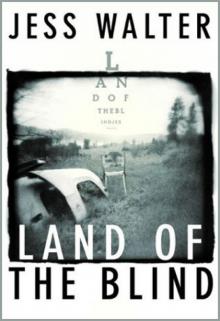 Land of the Blind
Land of the Blind Don't Eat Cat
Don't Eat Cat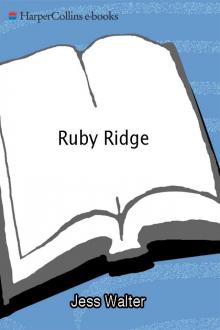 Ruby Ridge: The Truth and Tragedy of the Randy Weaver Family
Ruby Ridge: The Truth and Tragedy of the Randy Weaver Family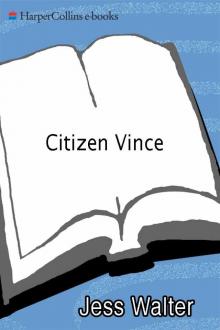 Citizen Vince
Citizen Vince Beautiful Ruins
Beautiful Ruins We Live in Water
We Live in Water The Zero: A Novel
The Zero: A Novel The Zero
The Zero The Cold Millions
The Cold Millions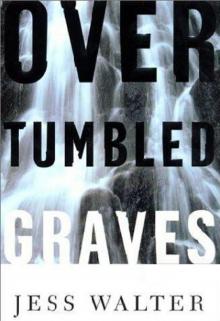 Over Tumbled Graves
Over Tumbled Graves We Live in Water: Stories
We Live in Water: Stories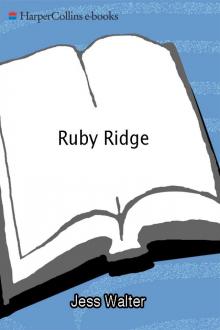 Ruby Ridge
Ruby Ridge (2006) The Zero
(2006) The Zero (2004) Citizen Vince
(2004) Citizen Vince